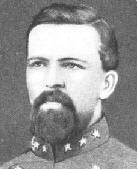From the Gold Rush of California To the Fields of Third Winchester
Another installment of “Tales From the Tombstone.” This post is part of the 150th Annviesrary of the Battle of Third Winchester coverage here on Emerging Civil War.
Archibald Campbell Godwin forever associated in Civil War history with his North Carolinian’s, was actually not a Tar Heel himself.
Born in 1831–even Ezra Warner does not list a date of birth–though some biographies list his birth as September 19th. However, on September 19, 1864, Godwin was killed in action at Third Winchester. Maybe the two dates were confused?
Either way, the young Godwin was born in Nansemond County, Virginia to John and Juliam Campbell Godwin. Yet, at a very early age Archibald was shipped off to a grandparent in Portsmouth, Virginia where he lived until his late teenage years.

Without continuing his education, Godwin caught the “gold fever” and headed west to California to try his luck in 1850. Apparently the upstart Virginian did quite well for himself, prospecting for gold and running a successful ranching operation. In the tumultuous election year of 1860, Godwin lost the vote for the Democratic nomination for California governor by a single vote!
If he would have won the nomination and then carried the governorship the near future might have been very stressful for the 29-year old. As he was losing the nomination by that solitary vote, trouble was brewing back east. Godwin packed up in California sometime in late 1860 and was back in Virginia at the outbreak of hostilities the following spring.
After offering his services to Confederate President Jefferson Davis, he received his commission as a major and first assignment was not on the front lines but as provost marshal for Libby Prison. Located in an old warehouse alongside the James River in downtown Richmond, Virginia, it quickly gained a reputation as a harsh and overcrowded confinement.
Godwin must have impressed a superior as a provost marshal as he was transferred south to Salisbury, North Carolina to oversee construction on the stockade there. This began his affiliation with the state of North Carolina.
In July 1862, now Colonel Godwin recruited the 57th North Carolina comprising men from the Tar Heel counties of Rowan, Forsyth, Catawba, Cabarrus, Lincoln, and Alamance; all located in more western-central North Carolina.
The regiment saw its first action in Virginia at the Battle of Fredericksburg in December as part of Brigadier General Evander Law’s Brigade in Major General John B. Hood’s First Corps Division. During the fighting at Chancellorsville the following May, the brigade fought as a part of Brigadier General Robert Hoke’s Brigade in Major General Jubal Early’s Second Corps Division.

With Hoke wounded, the regiment marched north to Gettysburg with another Tar Heel in command, Colonel Issac Avery. When Avery was mortally wounded on July 2nd leading the brigade against Cemetery Hill, Godwin assumed command.
Godwin would retain command of the brigade in as acting commander until the mishap at Rappahannock Station on November 7, 1863 when his command was overrun by Colonel Emory Upton’s Union Brigade–not the last time Upton’s Brigade would crack a Confederate line–and Godwin was captured.
Exchanged and promoted to brigadier general on August 5, 1864, Godwin returned in time to take part in the Shenandoah Valley Campaign that autumn.
At the Battle of Third Winchester, Godwin was struck by a bursting shell while leading his brigade, part of Major General Stephen D. Ramseur’s Division. Godwin was killed immediately by the fragments of that Union shell.
His body was laid to rest in Winchester, Virginia and is part of the Stonewall Cemetery, inside Mount Hebron Cemetery in downtown Winchester.
His death went unnoticed by adversaries though and when hostilities ended in 1865, Union authorities thought about imprisoning Godwin on war crimes because of his reportedly harsh treatments of Union prisoners during his time in Richmond, Virginia and Salisbury, North Carolina.
A monument of Godwin is in Cedar Grove Cemetery which is located in Portsmouth, Virginia.

California leaves another mark on the Civil War!
Nansemond County, Va, is today the City of Suffolk.